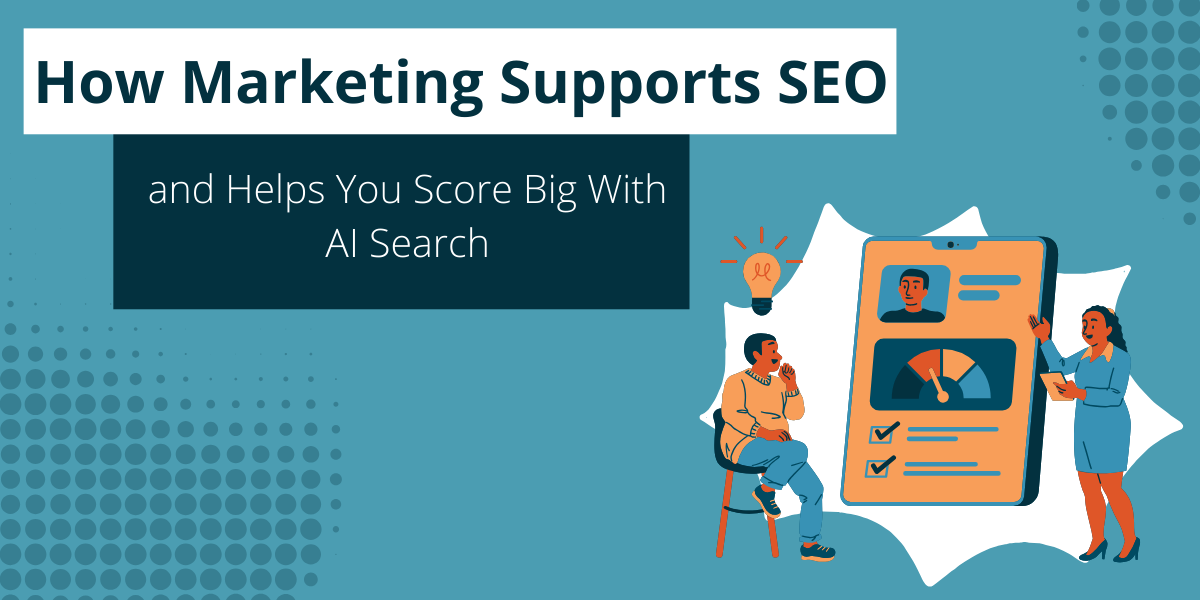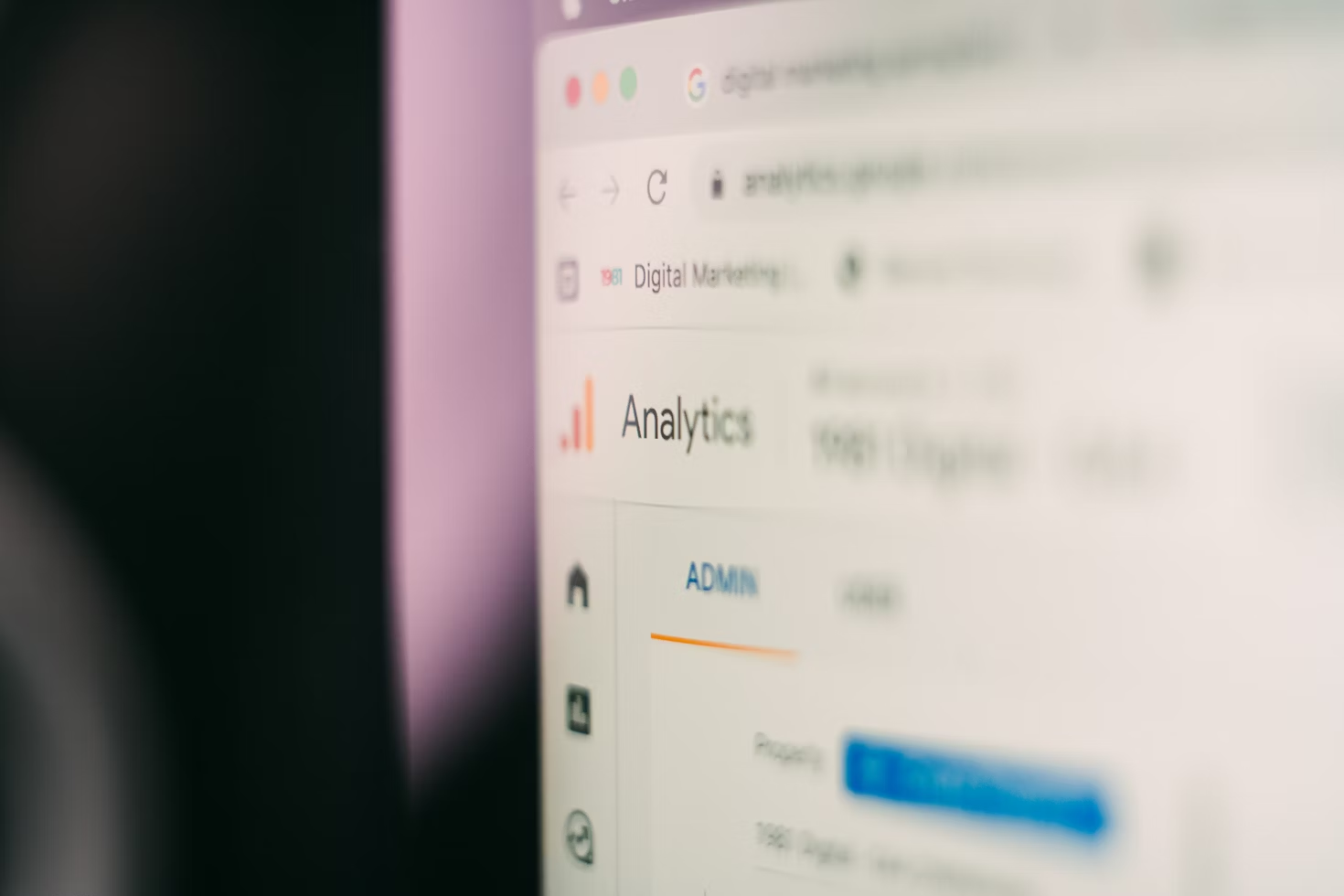How Marketing Supports SEO and Helps You Score Big With AI Search
August 18th, 2025 by
Key Insights
- AI search engines reward brands that align SEO with all marketing channels, including social, PR, paid, and email.
- Social media content marketing reinforces SEO performance by increasing entity signals and driving engagement.
- Earned media and PR build domain authority and citations that support higher search engine rankings.
- Email and paid campaigns indirectly boost SEO by influencing user behavior signals like CTR and repeat visits.
- AI SEO tracking tools and Google Search Console help track how your marketing efforts affect AI search visibility.
AI-generated search has changed what a winning digital marketing strategy looks like.
To stay competitive in search, you need more than keywords, high-quality backlinks, and old-school content marketing.
You need a coordinated offense.
If AI-powered search is your end zone, then SEO is your quarterback, calling the plays.
And your other marketing channels (social media, earned media, email, and paid campaigns) are the wide receivers, running backs, and tight ends moving the ball downfield.
When they work together, you don’t just show up in search — you win the search results.
Search rankings success now hinges on how well your entire marketing strategy supports visibility in Google’s AI Overviews and tools like ChatGPT and Perplexity.
Learn how content marketing, social media, PR, paid ads, and email all reinforce your search engine optimization efforts and help your brand dominate the AI-driven digital playing field.
Why SEO Needs a Team Effort in the Age of AI Search
AI search engines reward brands that align SEO and other forms of marketing for maximum authority.
Search engines like Google Search no longer rely solely on keywords and link building to decide what ranks. AI-powered search pulls from trusted sources, structured content, and recognizable entities.
Brands that show up consistently across the web, in blog posts, press releases, social profiles, and paid placements, are more likely to be recognized and cited in search engine results pages, including AI Overviews.
That consistency helps solidify your brand across the three key AI SEO pillars: entity recognition, semantic relevance, and authoritative citations. When your content, PR, and paid efforts echo the same message, it signals trust to both users and search engines.
Building SEO Momentum Across Your Marketing Channels
Social media: the unsung SEO MVP
View this post on Instagram
Social media posts amplify your SEO by reinforcing entities and driving engagement signals.
Platforms like TikTok, Instagram, and LinkedIn are now part of the search journey. With social content appearing in search results, these channels are critical for reinforcing relevance, brand awareness, and your online presence.
Best practices for social search optimization include:
- Using keywords in bios and captions/text posts to reflect your brand and services.
- Linking consistently to your core SEO pages.
- Repurposing high-quality content into bite-sized posts to boost visibility.
- Using hashtags strategically to build topical associations and reach your target audience.
Even more importantly, optimized social profiles with consistent NAP (name, address, phone number) data contribute to local SEO and entity alignment.
By driving traffic and user engagement, social also sends quality signals that search engines interpret as ranking factors. This not only improves on-page SEO but also strengthens your presence in organic search results and social search algorithms.
PR & earned media: link-building powerhouse
Earned media strengthens SEO by building authoritative citations and backlinks.
A press hit or podcast appearance isn’t just good publicity; it’s an SEO asset. Media mentions and thought leadership build domain authority and keyword associations that help you rank higher in organic search.
Ways to reinforce SEO in PR efforts:
- Include locked-in phrases (your preferred product or service descriptions) in boilerplate bios and releases.
- Syndicate press releases via newswire services to generate multiple backlinks and citations.
- Contribute guest posts to relevant industry blogs with links to cornerstone content.
- Promote media wins on social channels and your website to extend reach and reinforce relevance.
These earned links and mentions feed directly into Google’s understanding of your authority.
They can also boost brand awareness and credibility, which in turn fuels more engagement, links, and overall SEO success. In AI search results, those citations often become the deciding factor in whether your content gets featured.
Paid advertising & email campaigns: driving SEO clickstream data
Paid campaigns and email traffic support SEO by sending quality signals to key pages.
While paid search/PPC, digital ads, and email don’t directly influence search rankings, they impact user behavior metrics like pageviews, bounce rate, and time on page, all of which contribute to overall SEO performance.
Use paid advertising (paid search/PPC and digital ads) and email to:
- Drive targeted traffic to SEO-priority pages.
- Retarget users to increase return visits and page engagement.
- Feature blogs or cornerstone content in newsletters to boost visibility.
When users consistently visit and engage with your site after a paid ad or email click, analytics and tools like Google Analytics pick up on those signals.
They show that your content meets user intent and delivers value. In AI search engines, where quality content and user signals are ranking factors, this kind of reinforcement is critical.
Tracking Your SEO Wins in AI Search
Tracking tools reveal how your marketing impacts SEO visibility in AI-powered search.
You can’t improve what you can’t measure. Fortunately, new tools make it easier to track your AI search website traffic.
Here’s what to monitor:
- Referral traffic from generative AI sources
- Presence in AI Overviews or AI-generated responses.
- Entity recognition for your brand and key pages in tools like Scrunch AI.
- Search engine rankings and keyword rankings in traditional search. You should still care about organic search rankings because they are still used by most audiences, and they influence AI search results.
Despite popular belief, AI SEO isn’t a black box.
At Search Influence, we recommend AI SEO tracking tools for clients who want visibility into how their content is retrieved and referenced in tools like Google’s AI Overviews or ChatGPT.
Tools like Scrunch AI, Semrush, and Advanced Web Ranking are rolling out new features to help track keyword visibility and AI answer inclusion across different search results.
The ability to measure these AI SEO metrics gives your team the confidence to double down on what’s working and identify new content marketing opportunities that align with search intent and digital marketing best practices.
Higher Ed Example: When Marketing Plays as a Team
An integrated marketing strategy helps universities dominate AI search with consistent brand signals.
Let’s take higher education as a case study. Universities have complex websites with multiple departments, programs, and voices. When every touchpoint supports a unified SEO strategy, it makes a measurable difference in organic traffic, visibility, and user experience.
Despite this, 51% of higher ed marketing departments lack an SEO plan.
That’s like getting ready to snap the ball without having a play drawn up.
Here’s what it looks like when all higher ed digital marketing channels play like a team to support SEO:
- Press mentions are strategically related to, and link to, key website pages.
- Faculty speaking engagements are published on YouTube and social media.
- Social media posts present the same info as your blogs in a format designed specifically for that platform.
- Faculty bios link to relevant departments, publications, and press mentions.
- PR campaigns and social posts highlight research topics tied to search intent.
- Paid ad teams run ads to SEO-targeted website pages and blogs.
- Podcast appearances link to and mention key degrees and programs alongside your brand name.
At Search Influence, we’ve helped higher ed clients align SEO strategy with marketing efforts by identifying opportunities to promote targeted programs and degrees through traditional methods that support SEO, and by republishing assets online in a way that is best found and leveraged by search engines and AI models.
When SEO, PR, social, paid, and content marketing teams share data and strategy, the result is a powerful flywheel that delivers relevant content, builds domain authority, and earns organic traffic.
Bringing It All Together: Your Winning SEO Playbook
To win in the AI search era, you need every part of your digital marketing team working toward one goal: SEO success.
Here’s how your marketing supports the core principles of AI-driven SEO:
- Entities: Use structured content and consistent messaging to help search engines understand your brand and offerings.
- Semantic relevance: Align content across platforms to reinforce semantic relevance and meet user intent.
- Citations: Earn trust and build authority through strategic outreach, earned media, and consistent engagement.
A data-driven, coordinated approach ensures you’re not just showing up, but standing out.
FAQ: Marketing, AI SEO, and Brand Authority
How does social media help SEO rankings?
Social media boosts SEO by increasing entity mentions and driving engagement signals.
Search engines and users alike take note of your brand’s presence across platforms. Social profiles with complete business info, regular content posts, and linked landing pages help clarify who you are and what you do. When your content is widely shared, it gains visibility and relevance in the eyes of search engines.
How does earned media drive SEO success?
Earned media strengthens SEO with backlinks and authoritative citations.
Publications, podcast appearances, and industry blogs serve as third-party validators. These citations build trust and domain authority, two key elements in both traditional SEO and AI-driven rankings.
What’s the relationship between PPC and SEO?
Paid search (PPC) supports SEO by driving traffic and reinforcing branded search terms.
Paid search helps fill gaps while organic SEO takes time to build. When users see both your ad and your organic listing in the search engine results pages, they’re more likely to click. That overlap improves brand recognition, click-through rate, and long-term search performance.
How do you track AI search visibility?
AI SEO tools measure your brand’s presence in AI Overviews and conversational search.
Emerging platforms like Scrunch AI are designed specifically to track AI search visibility. They track how often your content appears in Google’s AI Overviews, ChatGPT citations, and other AI-driven results. Pair that with traditional metrics in Google Analytics and Google Search Console for a complete view of performance.
Why is branding important for AI search visibility?
Strong branding improves AI search visibility by helping engines recognize and prioritize your brand as a trusted entity.
When your name, offerings, and messaging are consistent across the web, from your website and social channels to business directories and review platforms, you build trust. That clarity and consistency make it easier for AI to pull accurate information about your brand and include it in AI-generated responses.
Ready to Win With SEO? Let’s Talk.
Want your marketing efforts to work harder for SEO and get results in AI search?
At Search Influence, we help brands align every part of their marketing strategy to drive visibility, authority, and engagement where it matters most. Our experts bring together quality content, technical SEO, paid media, and brand strategy to help you rank in search engine results and show up in AI-generated answers.
We specialize in working with higher education, healthcare, and hospitality brands that need long-term, scalable SEO strategies rooted in best practices.
Contact us today to learn how we can help you create a winning SEO strategy tailored to your goals.




